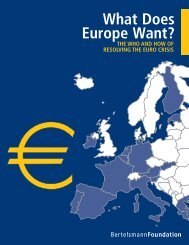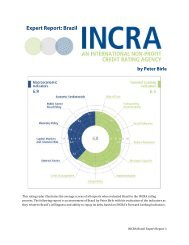BF-FieldManual-FEB13 -3.pdf - Bertelsmann Foundation
BF-FieldManual-FEB13 -3.pdf - Bertelsmann Foundation
BF-FieldManual-FEB13 -3.pdf - Bertelsmann Foundation
- No tags were found...
Create successful ePaper yourself
Turn your PDF publications into a flip-book with our unique Google optimized e-Paper software.
services exports, 10 has been affectedby deteriorating European consumerdemand. Perhaps the most acute impactis on the National Export Initiative (NEI),which seeks to double US exports by 2015.Second, trans-Atlantic investment stockin the US accounts for 72 percent of totalforeign direct investment and originatesthrough US affiliates and subsidiaries ofEuropean firms and European banks. 11In an effort to bolster capital at home,European banks have already begun adeleveraging from US holdings, whichcontributed to a 28 percent year-on-yeardecline of European FDI into the US inthe first three quarters of 2011. 12 Also,weakened consumer demand in Europewill hurt the return on investment ofEurope-based US FDI. Finally, direct USbank exposure to Greece, Portugal, Italy,Spain and Ireland totals $770 billion, or7.5 percent of total overseas exposure,not including credit default swaps(CDSs) and other offsets intended tomanage that risk. Indirect US bankingsectorexposure to the eurozone crisisthrough its linkages to assets in theUK, France, Italy and Germany couldnot only affect the balance sheets of USbanks but also pose a potential creditrisk to the US real economy. The currentrecessionary pressure in Europe willcontinue to act as a drag on the US andglobal economies as well.The blowback from a eurozone collapseor even the exit of a few countries couldenvelop the US economy for the nextdecade. According to the <strong>Bertelsmann</strong>Stiftung, the costs of a Greek exit wouldlead to a 0.9 percent decline in US GDPbetween 2013 and 2020 when comparedwith a baseline scenario of no exit. Andthe contagion effects would increasethe likelihood of further exits of otherSouthern European member states,including Portugal, Spain and Italy. Inthe event that Portugal were also to exit,the projected decline in US GDP wouldbe 3.3 percent (a loss of $365 billion). ASpanish exit in addition to that wouldcost the US economy 11 percent of itsGDP (a loss of $1.244 trillion), and thecumulative effect including Italy wouldcause the US economy to suffer lossesof 25 percent of GDP over seven years...the US, as the underwriter of European security,has a wholly legitimate role to play in helping to guidethe future of European integration.($2.825 trillion). 13 By comparison, theCongressional Budget Office estimatesthat the cost of the US’s going over thefiscal cliff would have been a 0.5 percentcontraction in US GDP in 2013, a net 2.5percent correction under projected 2013GDP growth of 2.0 percent. 14Aside from the economic interconnectivityacross the Atlantic, theUS’s significant equities in the eurozonelends credibility to Washington’scontinued role in the region’s crisismanagement. The administrationmust shape its policies with thisinterconnectivity in mind. First, theUS, as the underwriter of Europeansecurity, has a wholly legitimate role toplay in helping to guide the future ofEuropean integration. The US military,with four combat brigades comprisingaround 80,000 troops stationed inEurope, 15 is the largest contributor toNATO financially and militarily, and itis perceived as the informal guardianof stability and territorial integrity fromEstonia to Portugal. Additionally, theUS credit line to the IMF, Washington’sonly direct participation in the troika,represents 18 percent of the IMF’s totalfirepower. 16 IMF does not disclose fromwhich members of its shareholders itdraws upon in its assistance packages.However, if it were to draw from allshareholders, the US is proportionallyresponsible for around $5 billion forboth packages for Greece, approximately$5 billion in Portugal and $4 billion inIreland of the currently allocated €403billion of troika assistance for the threecountries. This is roughly the equivalentto the cumulative contributionsof the Netherlands and Finland tothe EFSF/ESM.European PerspectivesThe crisis has drawn out politicalfault lines, many of which had beenin remission for the previous decade.These include cleavages between theeurozone’s north and south, membersand non-members, Germany andFrance, local and national governments,and, most recently, the IMF and theEurogroup. Differences among themember states are largely embeddedin fundamental differences in socialcontracts, stark policy divergences overthe past decade, and serious inequitiesin current economic performance. In theabsence of a robust common Europeanpolitical culture, discussion and debatehas retrenched in individual countries.Germany’s centrality to an eventualresolution of the crisis is widelyacknowledged. Usually quite sensitive tointernational perception of its politicalaction, Germany has been largelyunmoved by criticism from partnerstates inside and outside the eurozoneand international organizations such asthe World Bank, the OECD and the IMF.Merkel’s government has instead reliedon a formula of policy prescriptionsand political tactics: 1) the primacyof austerity as a policy prescription,followed distantly by structural reformpromotion; 2) delayed decision-makingdriven by domestic political timetables;3) a key role in lowering expectationsin the run-up to EU summits and otherpotential turning points, and occasionalpost-summit policy clawbacks; 4)undefined hints of future political union.Assets in Germany, particularlysovereign bonds, have become attractiveto investors looking for refuge from thecurrency uncertainty of the eurozonesouth. The glut of excess capital inGermany has had a marked effect onpolicy behavior. The country’s lowborrowing costs combined with arelatively agile labor market (a productof massive structural reforms under theGerhard Schröder government) and ageneral decline in the value of the euromade Germany a credible investmentdestination and competitive globalexporter in 2010 and 2011. As a result,Germany remained largely impervious tothe economic hardship that gripped the2 0The Eurozone Crisis






